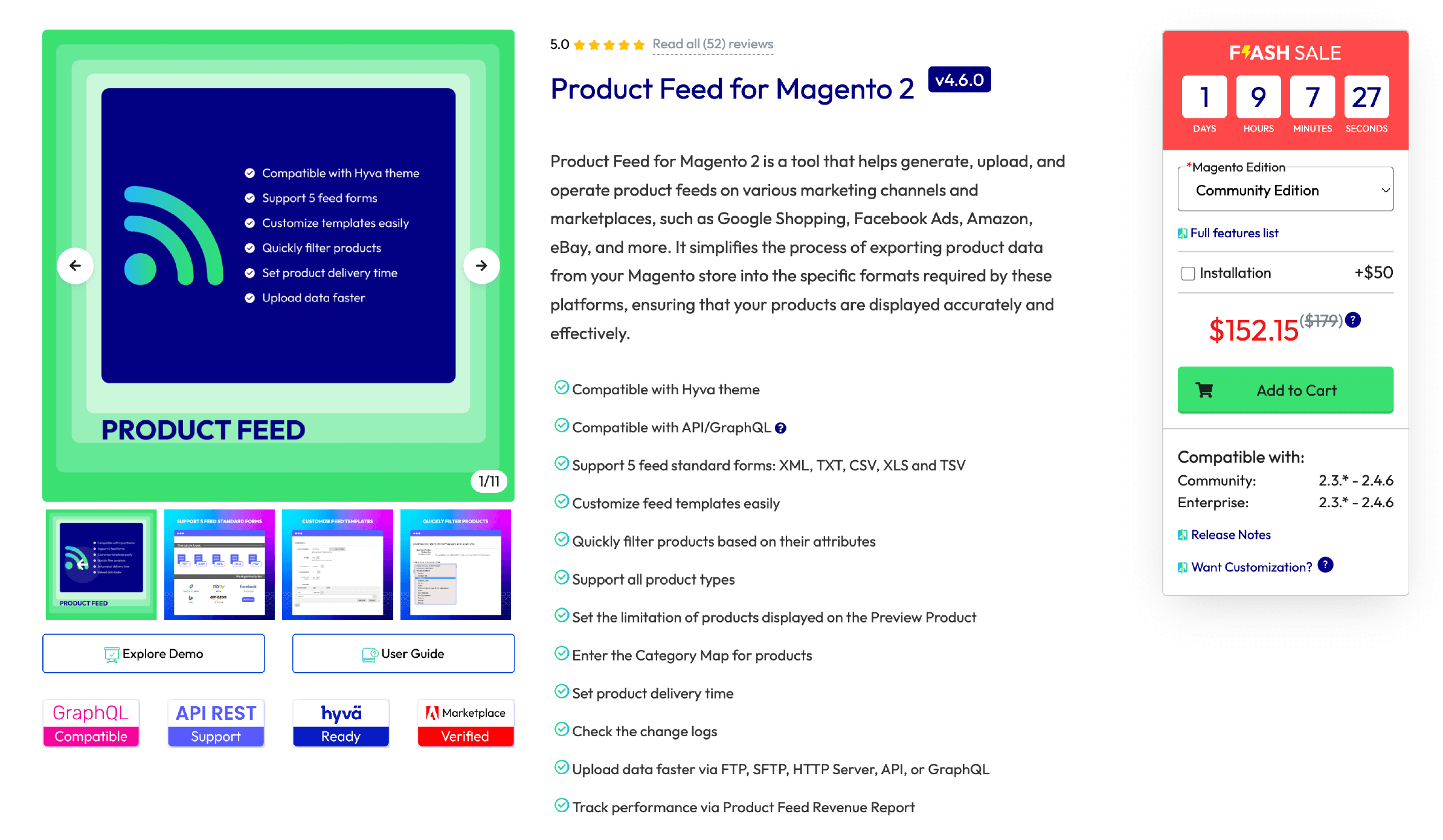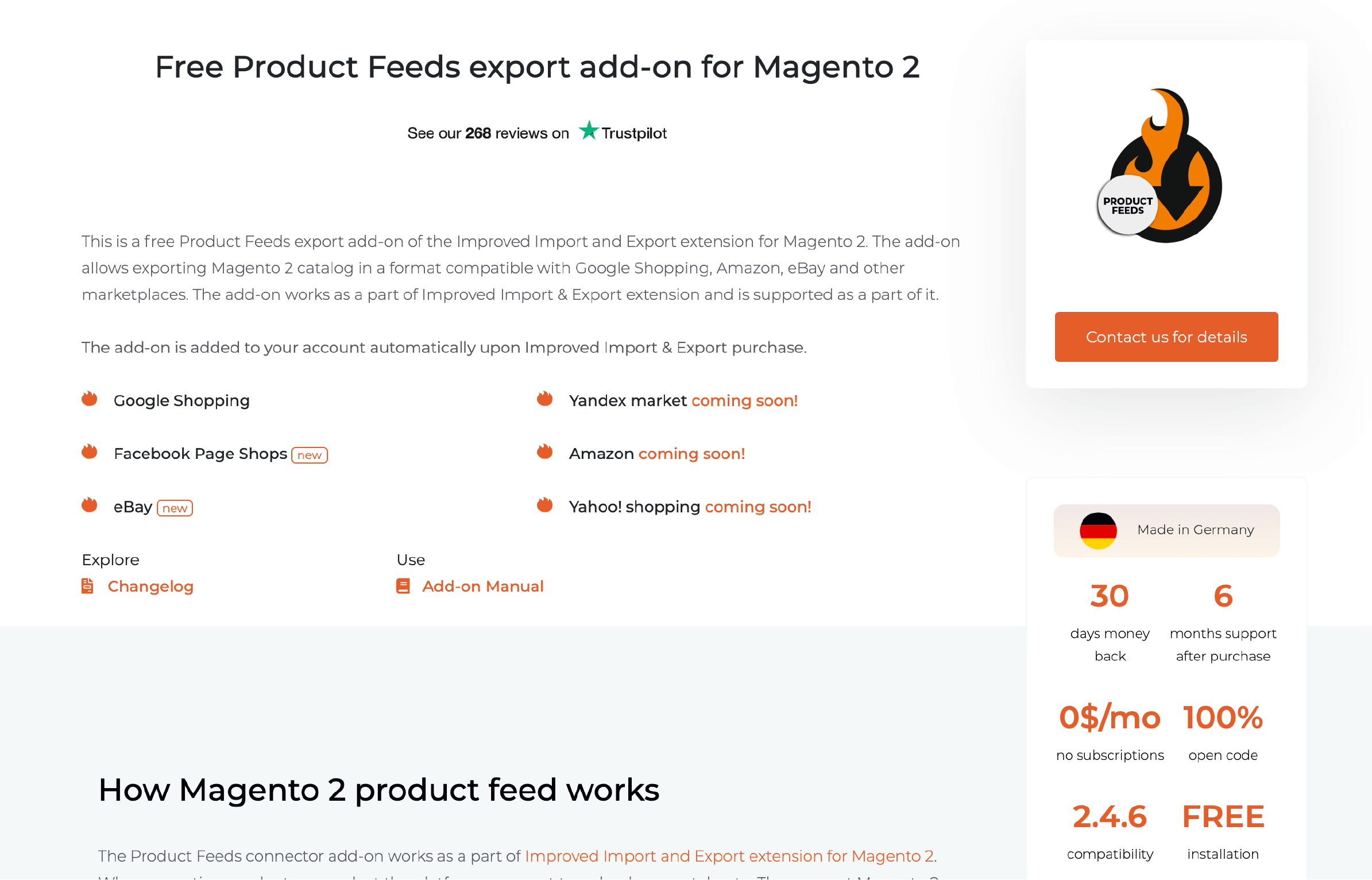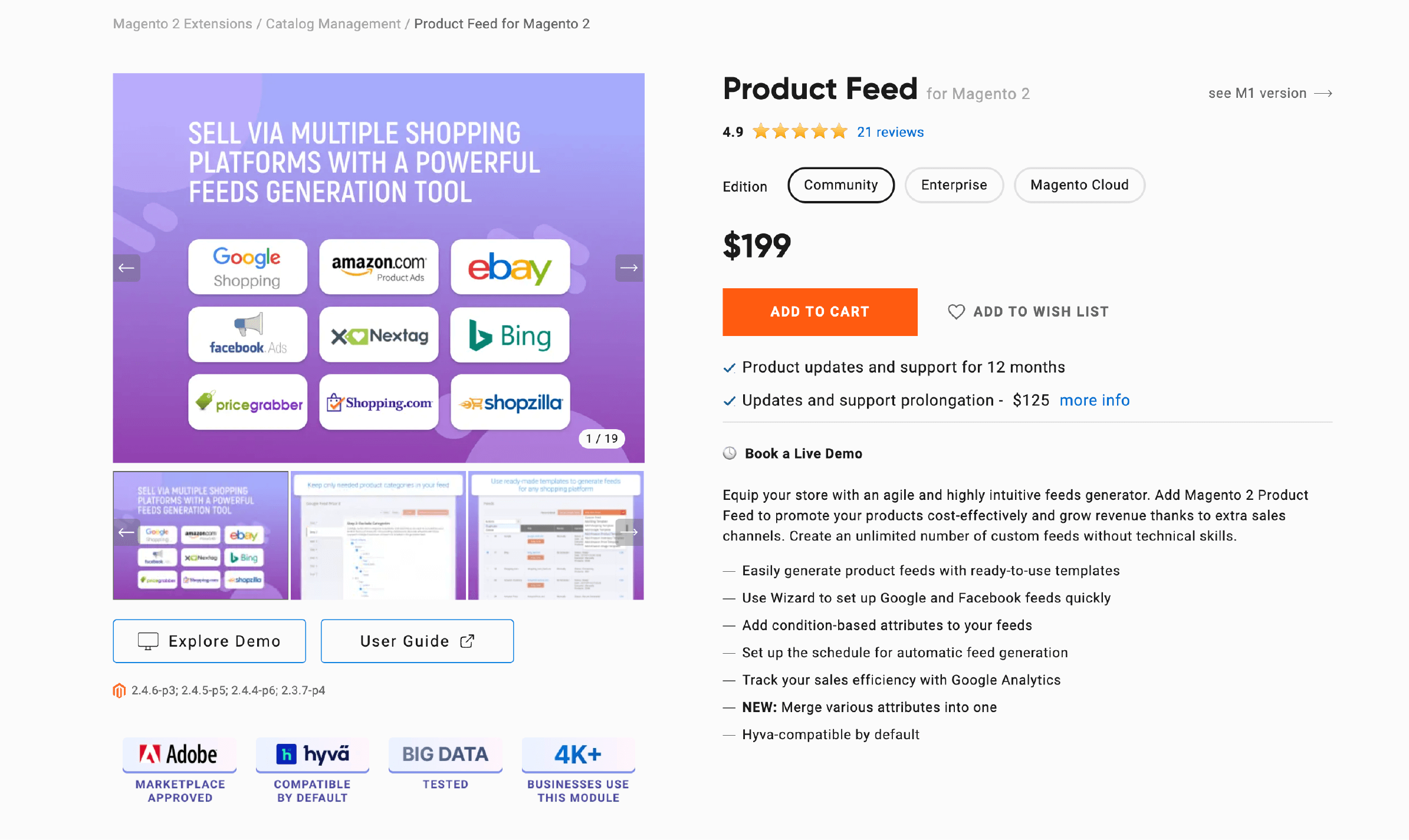
Magento Product Feed: Benefits and Ways to Optimize
Magento product feeds enable search engines and other platforms to display your products to potential customers actively searching for them. These product feeds contain detailed information about your products. It includes their titles, descriptions, prices, and availability. This article discusses the advantages of Magento product feed extensions and strategies to enhance product feeds for increased sales. It also includes top product feed extensions for your Magento ecommerce.
Key Takeaways
-
Discover the significance of Magento product feeds in expanding product visibility across diverse online platforms for increased sales.
-
Explore essential features in Magento 2 product feed extensions, ensuring seamless integration and efficient data management.
-
Learn how to optimize product feeds using ready-to-use templates, regular updates, and effective feed analysis for better sales performance.
-
Explore top product feed extensions for Magento 2 by Mageplaza, Firebearstudio, and Amasty, each offering distinct functionalities and advantages.
-
Learn how integrating product feed extensions aids in inventory management and ensuring accurate product availability across multiple websites.
What is a Product Feed in Magento?
 A product feed is a carefully structured file designed to contain vital information about your Magento products. This data is organized in widely accepted formats such as XML, CSV, XLS, TSV, or TXT. These formats make it accessible for various platforms to read and process the information efficiently.
A product feed is a carefully structured file designed to contain vital information about your Magento products. This data is organized in widely accepted formats such as XML, CSV, XLS, TSV, or TXT. These formats make it accessible for various platforms to read and process the information efficiently.
Each product is listed within the feed with a unique identifier, accompanied by essential product attributes like the product's title, description, price, and image URL. It can be submitted to various platforms, including search engines, marketplace, and comparison shopping engines. It promotes your products and significantly enhances traffic to your Magento online store.
It can be achieved by employing extensions to automate and synchronize the feed's content. It helps ensure that product attributes, pricing, images, variants, categories, and mapping are accurate and appealing to potential customers.
Benefits of Integrating Product Feed in Magento 2
Integrating a product feed within the Magento 2 platform offers advantages:
-
Enhanced Visibility: Integrating a product feed expands your product’s reach to various online platforms. It includes search engines, marketplaces, and comparison shopping engines. This increased visibility exposes your products to a wider audience.
-
Streamlined Updates: Integrating a product feed automates updating essential product information. It includes changes in product prices, availability, descriptions, and other details. Automation ensures that your customers always have access to accurate and up-to-date information, which improves customer shopping experience.
-
Time and Cost Efficiency: Updating product information across multiple platforms is time-consuming and prone to Magento errors. Product feed integration eliminates the need for repetitive manual tasks, saving your team valuable time and reducing operational costs.
-
Optimized Product Data: Product feeds allow you to optimize product attributes to make your product listings more appealing. You can create compelling titles, detailed descriptions, and eye-catching images. These optimizations can increase click-through rates and conversions.
-
Increased Sales: Product feed integration simultaneously showcases your products across various online platforms. This exposure increases the likelihood of attracting more customers, consequently driving higher sales volumes for your e-commerce business.
-
Competitive Edge: Staying updated with current market trends and competitor’s pricing is crucial in the e-commerce industry. Product feed integration enables you to monitor your competitors closely. You can easily adjust prices based on market conditions, demand, or other factors, ensuring that your pricing remains competitive and maximizes profitability.
-
Effortless Inventory Management: Maintaining consistent Magento inventory levels is crucial to prevent overselling and disappointing customers. Integrating your product feed helps synchronize inventory data across various platforms, ensuring accurate product availability and preventing order-related issues.
-
Customization Options: Many product feed solutions offer customization options. You can tailor your product listings to match the specific requirements of different platforms. Customization allows you to present your products in the most attractive and relevant way to potential customers on each platform.
-
Analytics and Insights: Product feed integration often includes advanced analytics tools. These tools provide valuable insights into your product performance, customer behavior, and sales trends. It also includes evaluating metrics such as impressions, click-through rates (CTR), and generated revenue. These insights are often presented in visually engaging charts and grids. These statistics help refine future marketing strategies and optimize your product feed approach.
-
Scalability: As your e-commerce business grows, product feed integration can effortlessly adapt to accommodate your expanding product catalog and increasing website traffic. It provides a scalable solution that can grow with your business.
-
SEO Boost: Structured product feed data is highly favorable to search engines. It enables search engines to understand and index your products more effectively. As a result, your website's search engine rankings improve, leading to greater visibility and more organic traffic.
-
Mobile Responsiveness: A well-structured product feed ensures that your product information displays correctly on mobile devices. It enhances the user experience for mobile shoppers and increases sales.
-
Enhanced Customer Trust: Displaying your products across multiple reputable platforms can instill greater customer trust. When customers encounter your products in various places, it suggests their quality and worthiness. This enhanced trust can build a stronger and more positive brand image for Magento 2 stores over the long term.
Essential Features to Consider in Magento 2 Product Feed Extensions
When considering product feed extensions for Magento 2, learn about the key features that can greatly benefit your e-commerce business. Here are the essential features to look for:
-
Extension Compatibility: Ensure the product feed extension is compatible with your Magento 2 version. Compatibility ensures smooth integration and operation.
-
Flexible Data Feed Generation: Consider options for creating feeds in various formats like XML, CSV, etc. This flexibility enables you to cater to different platforms and marketplaces.
-
Category Mapping: The ability to map product categories ensures your products appear in the right categories on various platforms, improving visibility. It ensures products are listed accurately on shopping platforms.
-
Custom Attributes: The extension should support custom attribute values, allowing you to include unique product information in your feeds.
-
Multiple Marketplaces: Choose an extension that supports integration with multiple marketplaces, not just Google Shopping. It helps expand your reach.
-
Google Analytics Integration: Integration with Google Analytics can provide valuable insights into the performance of your product listings.
-
Scheduled Feed Updates: The option to schedule feed updates simplifies the process of keeping your product information current.
-
Filtering and Sorting: Look for tools that filter and sort products based on various criteria to create targeted feeds.
-
User-Friendly Interface: An intuitive interface ensures that even those without extensive technical skills can manage the extension effectively.
-
Comprehensive Reports: Access to reports provides in-depth information on feed performance, helping you make informed decisions.
-
Support for Child Products and Parent Products: Ensure the extension can handle the inclusion of child products within parent categories.
-
Easy Installation and Configuration: A straightforward installation and configuration process saves time and minimizes issues.
-
FTP or SFTP Support: Support for FTP or SFTP allows secure file transfer to platforms or marketplaces.
-
Google Tag Manager Integration: Integration with Google Tag Manager simplifies tracking and managing campaign UTM parameters.
-
Developer Support: Access to developer resources, user guides, and a helpful support team can assist with any issues or customizations.
-
Advanced Product Filtering: Advanced filtering options, including pattern-based and attribute-based filters, provide better control over which products appear in feeds.
-
Template Library: Access to pre-built feed templates can streamline the feed generation process.
-
B2B and Enterprise Features: Consider features tailored for B2B or enterprise-level e-commerce, such as support for Magento Commerce (formerly Magento EE) or Magento Commerce Cloud (formerly Magento ECE).
-
Easy URL Configuration: Simplified URL configuration for product feed URLs ensures they are user-friendly and effective.
Ways to Optimize Product Feeds for Magento Stores
1. Choose Proper File Formats

Select suitable file formats for your product data, such as .XML, TXT, or .CSV. These formats are compatible with popular shopping marketplaces like Google Shopping, Facebook, Amazon, and eBay. It ensures your data feed seamlessly integrates with these platforms.
2. Use Ready-to-Use Feed Templates
Product feed extensions offer ready-to-use feed templates tailored to Magento 2 stores. These templates are designed for high performance and to meet the requirements of major selling channels.
3. Create Multiple Templates
Administrators can create multiple templates using versatile variables provided by the extension. This flexibility allows for tailored product feeds to suit different platforms and marketplaces.
4. Regularly Update Feeds
Consistently update crucial data within your product feeds, including prices, product descriptions, titles, and attributes. Regular updates significantly improve your store's performance on various marketplaces. Product feed extensions offer automatic updates based on specific schedules, such as daily, weekly, or monthly, ensuring your data is always current.
5. Efficient Feed Management
Utilize the Product Feed module's feed logs to manage all product feeds across selling channels and marketplaces. This feature allows administrators to maintain control and promptly address any unexpected issues, streamlining feed management without excessive workload or time-consuming tasks.
6. Analyze Data Feeds
Track and evaluate their effectiveness after generating and running product feeds on shopping search engines. Through analysis, e-commerce owners can fine-tune data feeds and devise effective strategies for their products on marketplaces.
7. Utilize Google Analytics
Leverage Google Analytics to gain comprehensive insights into the performance of your products on various search engines and platforms. This data empowers administrators to make informed decisions and optimize their product feeds effectively.
Examples of Best Product Feed Extensions for Magento 2
1. Product Feed for Magento 2 by Mageplaza

Mageplaza's Product Feed for Magento 2 streamlines creating, uploading, and managing product feeds across multiple marketing channels and online marketplaces. This extension supports platforms like Google Shopping, Facebook Ads, Amazon, and eBay. It simplifies the import and export of product data from your Magento store into the required formats for these platforms, ensuring precise and efficient product displays.
Features:
- Customizable Templates in Liquid.
- Automated Product Feed Creation.
- Google Analytics Integration for Campaign Management.
- Hyva Theme Compatibility.
- API/GraphQL Compatibility.
- Support for 5 Feed Standard Formats: XML, TXT, CSV, XLS, and TSV.
- Easy Feed Template Customization.
- Efficient Product Attribute Filtering.
- Product Display Limitation for Preview.
- Category Mapping for Products.
- Change Log Monitoring.
- Fast Data Upload via FTP, SFTP, HTTP Server, API, or GraphQL.
- Performance Tracking with Product Feed Revenue Report.
Pricing: Starts at $179.
2. Product Feed by Firebearstudio

Firebearstudio's Product Feed extension streamlines the import and export process, fully automating it through a cron scheduler. It allows the import and creation of all product types from a single file. It includes additional entities like orders, customers, cart price rules, categories, CMS blocks, and pages for import and export. You can import files from Google Sheets, FTP/SFTP, local files, Dropbox, or direct URLs.
Features:
- Import from Google Sheets, FTP/SFTP, Dropbox, SOAP, REST API, or direct URL.
- Import and create all product types from Excel, CSV, XML, and JSON files.
- Flexible EAV import: attributes, values, and attribute sets from any source and format.
- Import any XML files with XSLT transformation templates.
- User-friendly and intuitive admin interface.
- Adjust product prices by percentage or fixed value during import.
- RabbitMQ support for product image import.
Pricing: Starts at $599.
3. Product Feed for Magento 2 by Amasty

Amasty's Product Feed extension empowers store owners to set up and oversee product feeds for numerous comparison shopping engines efficiently. The addition of the Magento 2 Data Feed Manager enhances its versatility, making it an effective tool for creating Google shopping feeds. It is also compatible with both Google and Facebook's file formats and tags, allowing profiles created using the Google Feed Wizard to work seamlessly on both platforms.
Features:
- Generate product feeds effortlessly using templates.
- Quickly set up Google and Facebook feeds with the Wizard tool.
- Include condition-based attributes in your feeds.
- Schedule automatic feed generation.
- Monitor sales performance with Google Analytics.
- Consolidate multiple attributes into one.
- Default compatibility with the Hyva theme.
Pricing: Starts at $199.
FAQs
1. What is a product feed plugin, and how does it benefit merchants?
A product feed plugin is a tool that structures essential product information like titles, descriptions, and prices in a format readable by various platforms. It helps merchants display their products across multiple online platforms, increasing visibility and boosting Magento sales by reaching a wider audience.
2. Can developers customize product feed templates for specific categories?
Yes, developers can tailor product feed templates to match different product categories. This customization allows for a more targeted approach, ensuring products are presented accurately and attractively across various platforms.
3. How can merchants optimize their product feeds for better sales performance?
Merchants can optimize product feeds by regularly updating crucial data like prices and descriptions, utilizing ready-to-use templates, and analyzing feed effectiveness using tools like Google Analytics. These steps can significantly enhance sales performance across shopping feeds and campaigns.
4. Are different versions or product feed extensions available for purchase?
Yes, various product feed extensions with different features and capabilities are available. These extensions cater to diverse merchant needs, offering integration, feed generation, and analytics flexibility to enhance their online store's performance.
5. How does integrating product feed extensions assist in inventory management?
Integrating product feed extensions helps synchronize inventory data across multiple platforms, ensuring accurate product availability. This integration prevents order-related issues like overselling and maintains seamless inventory management for merchants across different websites.
Summary
Magento product feed serves as a structured file containing vital details about products. It helps in displaying products across diverse online platforms. It enhances visibility, streamlines updates, and boosts sales. We covered the advantages of Magento product feed integration, optimization strategies, and what to consider in product feed extensions.
Explore Magento server hosting options to ensure seamless integration and optimal performance for your Magento store's product feeds.


